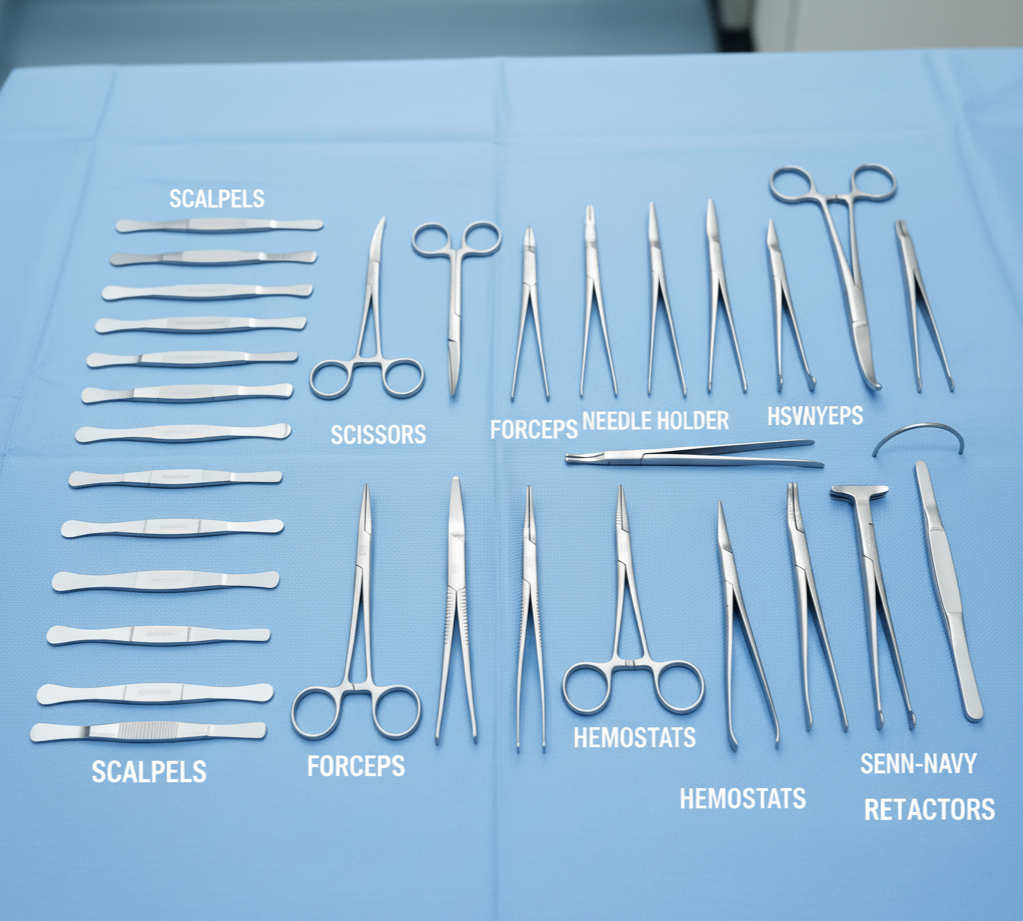In the medical field, surgical instruments are essential for every procedure. Whether it’s a minor surgery or a complex operation, the choice of instruments determines accuracy, safety, and success. If you are searching for surgical instruments name, this detailed guide will help you understand the different instruments, their categories, and their uses.
Why Learning Surgical Instruments Name is Important
Knowing the correct surgical instruments name is valuable for:
- Medical students – to identify instruments during training.
- Surgeons & healthcare staff – to select the right tool quickly.
- Buyers & distributors – to order the correct products.
- Hospitals & clinics – to manage inventory accurately.
Categories of Surgical Instruments Name
Surgical instruments are usually classified based on their function. Below are the main categories:
Cutting and Dissecting Instruments
These are designed to cut tissues, skin, or sutures.
- Scalpel – Used for precise incisions.
- Surgical Scissors – Straight or curved, used to cut tissues or sutures.
- Bone Cutter – For cutting bones in orthopedic surgeries.
Grasping and Holding Instruments
These instruments hold tissues, sutures, or medical materials during procedures.
- Forceps – Used to grasp tissues; available in toothed and smooth types.
- Needle Holder – Holds surgical needles while suturing.
- Towel Clamp – Holds drapes or tissues in place.
Clamping and Occluding Instruments
These control blood flow and prevent bleeding during surgeries.
- Hemostats – Clamp blood vessels.
- Artery Forceps – Secure arteries during surgery.
- Bulldog Clamp – Small clamp for vascular surgeries.
Retracting and Exposing Instruments
These instruments hold tissues aside to provide better visibility.
- Retractors – Self-retaining or handheld types.
- Speculum – Used in gynecology and ENT surgeries.
- Skin Hooks – Gently retract skin.
Suturing and Stapling Instruments
Used to close wounds after surgery.
- Needle Holder – Guides the needle during suturing.
- Surgical Stapler – For quick incision closure.
- Suture Scissors – To cut sutures cleanly.
Specialized Surgical Instruments
Different surgical specialties require unique tools.
Dental Surgical Instruments Name
- Extraction Forceps
- Elevators
- Periodontal Scalers
ENT Surgical Instruments Name
- Ear Speculum
- Nasal Speculum
- Laryngoscope
Orthopedic Surgical Instruments Name
- Bone Drill
- Plate and Screw Set
- Orthopedic Saw
Cardiovascular Surgical Instruments Name
- Vascular Clamp
- Aneurysm Needle
- Vein Retractor
Importance of High-Quality Surgical Instruments
When choosing surgical instruments, quality should be the top priority.
Benefits of Premium Instruments
- Durability – Made from stainless steel.
- Safety – Prevents infections and complications.
- Accuracy – Provides precise results.
- Cost-Effectiveness – Long-lasting performance.
Factors to Consider Before Buying Surgical Instruments
When looking for surgical instruments by name, keep in mind:
- Material – German stainless steel is most reliable.
- Certifications – Look for CE, ISO, or FDA approvals.
- Supplier Reputation – Choose trusted exporters or manufacturers.
- Maintenance Needs – Instruments must withstand sterilization.
Advantages of Buying Surgical Instruments Online
Searching surgical instruments name online helps you:
- Explore a wide variety of products.
- Compare prices and quality.
- Order directly from manufacturers.
- Save time with fast global delivery.
Why Choose Professional Enterprises for Surgical Instruments
At Professional Enterprises, we specialize in manufacturing and exporting surgical and dental instruments worldwide.
What We Offer
- Premium German stainless steel instruments.
- Full catalogs with product names and codes.
- Custom branding and private labeling.
- Competitive prices with worldwide shipping.
FAQs About Surgical Instruments Name
Q1: How many types of surgical instruments are there?
There are hundreds, classified into cutting, grasping, clamping, retracting, suturing, and specialty instruments.
Q2: Which surgical instruments are most commonly used?
Scalpels, scissors, forceps, and retractors are among the most common.
Q3: Can I order surgical instruments by name only?
Yes, most suppliers provide instruments with standard names and product codes.
Q4: Where can I get a complete list of surgical instruments name?
From manufacturer catalogs, medical textbooks, or professional exporters like Professional Enterprises.
Conclusion
Understanding surgical instruments name is essential for students, surgeons, buyers, and healthcare providers. With the correct knowledge, you can identify, purchase, and use surgical tools efficiently.

